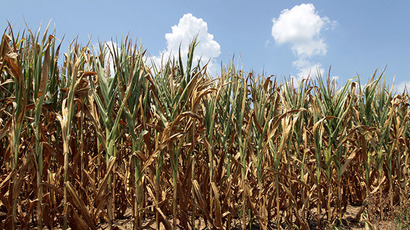Millions in farm subsidies doled out to dead US farmers

Millions of dollars have gone to farmers years after their death as part of various farm safety net programs under the US Department of Agriculture, according to a recent government audit.
Federal auditors who poured through the USDA’s crop insurance,
disaster assistance and conservation programs have found that
$36.6 million were disbursed to deceased recipients, according to
the nonpartisan Government Accountability Office (GAO).
The GAO report points to the biggest offender as the USDA’s Risk
Management Agency, which disburses crop insurance, as having
issued $22 million in subsidies one or two years after a
recipient’s death.
The report has been released ahead of meetings in the House and
Senate to hammer out a farm bill that may expand subsidies like
crop insurance, and casts doubts on the Agriculture Department’s
ability to weed out waste, fraud and abuse.
The GAO itself states that findings "may call into question whether these farm
safety net programs are benefiting the agricultural sector as
intended."
Though the funds improperly doled out to the deceased farmers
represent a fraction of the $20 billion in annual federal
subsidies for farm incomes, as the Los Angeles Times reports, the
report also comes at a critical juncture for Congress as both
parties spar over the total cost of a pending $1 trillion farm
bill. And if segments such as crop insurance do increase as
expected, then the USDA’s inability to detect waste or fraud may
only increase accordingly.
For its part, the department of agriculture is not disputing the
GAO’s findings, though it has taken exception to claims that it
did not have sufficient controls in place to detect improper
payments, according to the New York Times.
Environmental activists, who oppose federal subsidies that, for
example, encourage an artificially inflated production of corn
- with implications into
the popularity of GMO crops and the widespread use of
high-fructose corn syrup - point to government waste as
indicating a need for reforms.

“Not only are unlimited crop
insurance subsidies flowing to the largest and most successful
farm businesses, they are now going to deceased
policyholders,” said Scott Faber, vice president of the
Environmental Working Group in a statement issued Monday.
“At a time when some lawmakers
want to cut off funding for the hungriest children, we find out
today the federal government has spent $22 million over four
years to lavish insurance subsidies to individuals who are no
longer alive,” added Faber.
The Environmental Working Group (EWG) opposes what it deems
“bloated” farm subsidies
that produce ultimately harmful incentives to plow up wetlands,
grasslands and marginal lands, or place any emphasis on soil
health. As RT recently reported, corn subsidies combined with a
growing deficiency in GMO corn has resulted in greater use of
pesticides.
According to a recent report published by the journal Food Policy
cited by EWG US farm subsidies ultimately “have negligible impact
on the prices paid by consumers for food. EWG cites other
evidence that even the total elimination of US farm programs
“would have a very modest
effect on farm prices and production” of subsidized crops
such as corn and wheat.
Though the debate over whether the currently gargantuan sum doled
out by the federal government in the form of the farm bill is
fair is ongoing, this latest disclosure of funds making their way
to deceased individuals only provides more ammunition to critics
of government waste.
Both EWG and a slew of advocacy organizations that are concerned
over everything from GMOs to pesticide use argue that crop
insurance programs in particular have been transformed from their
original intent, which was to compensate farmers from
weather-caused crop losses, to a virtual guarantee of farm
income.
GAO auditors are now suggesting that the USDA implement use of
the Social Security Administration’s Death Master File to
identify payments made to dead individuals. According to the GAO,
agencies under the department of agriculture are currently
utilizing an incomplete version of that data, and thus failing to
identify deceased recipients.














